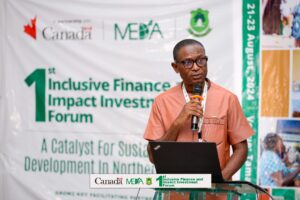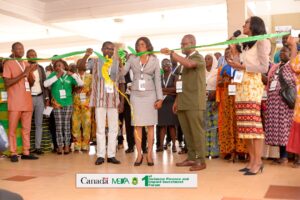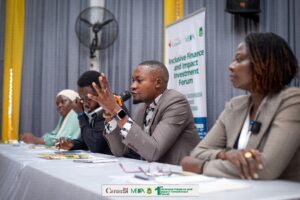By Samuel Sam
The maiden edition of the Inclusive Finance and Impact Investment Forum (IFIIF) – which addresses the critical challenges of financial inclusion and investment accessibility for women-led agribusinesses in northern Ghana – has been held at Tamale, Northern Region, from 21st to 23rd August 2024.
Organised by the Mennonite Economic Development Associates (MEDA) Greater Rural Opportunities for Women 2 (GROW2) project, in partnership with the Department of Agribusiness at the University for Development Studies (UDS), Faculty of Agriculture, Food, and Consumer Sciences (FoFACS), the forum to provides a platform for dialogue, knowledge-exchange and matchmaking between impact investors and women-led agribusinesses.
GROW2 is a five-year project implemented by MEDA and funded by Global Affairs Canada. It aims at supporting 40,000 women smallholder farmers, 5,000 entrepreneurs and 50 agribusinesses – of which at least 50 percent are women-led in the soybean, groundnut and vegetable value chains of northern Ghana – by fostering an improved business environment, increased adoption of environment-sustainable and nutrition-focused agricultural practices and enhanced gender equity.

The forum, moderated by the Aspen Network of Development Entrepreneurs (ANDE) West Africa Chapter, brought together 150 participants including representatives from the Ministry of Food and Agriculture, financial institutions, impact investors, agribusiness networks, women in agribusiness caucuses, development partners, agricultural industry actors, academicians, researchers, students, entrepreneurs, processors and farmers among others, and sought to bridge the gender gaps where women-led agribusinesses find it difficult to access finance for growing their businesses.
Northern Regional Director -Department of Agriculture, Hajia Hawa Musa. said improving access to financial opportunities among women-led agribusinesses helps boost their business.
Financial inclusion for women can therefore not be discussed in exclusion of the need for a healthy agro-economy, she said.

“The prolonged drought poses a potential threat to food security in Ghana because a majority of our women entrepreneurs in our part of the country are engaged in agribusiness; hence the need for public-private sector support to revamp the sector,” she bemoaned.
Dr. Vivian Boateng, Head-Department of Agribusiness, UDS, envisages the forum to be “a real experience where fruitful business deals will be sealed for gender inclusivity and sustainable women businesses across Northern Ghana”.
Senior Regional Director-MEDA, West and Central Africa, Dr. Pierre Diegane Kadet said, MEDA is committed to investing in the agricultural sector in contributing to the transformation of agricultural systems to create jobs opportunities for women and youth.
“In Ghana, we have provided support to the agrifood Small and Medium Enterprises (SMEs) through several initiatives such as the first phase of the GROW2 project, Farmers’ Economic Advancement Through Seedlings (FEATS) and the Trading App,” he added.
Chief Risk Officer at Ghana Incentive-Based Risk-Sharing System for Agricultural Lending Project (GIRSAL), Ernest Tagbotor, said the organisation is focused on advancing financial inclusion and promoting sustainable development, particularly in the agricultural sector.

“We do this through the issuance of credit guarantees that make it easier for agribusinesses to access the financing they need. These businesses are the backbone of our communities, and by supporting them we help create jobs, improve livelihoods and drive economic growth in a way that benefits everyone,” he said.
He noted that the organisation supports businesses to ensure the businesses create lasting and positive impacts on the communities they serve.
Country Project Manager of GROW2, Francis Essuman, said despite their pivotal role in agriculture, women-led agribusinesses in the region often face significant barriers to accessing finance and investment opportunities compared with their southern counterparts – hence the forum.
He underscored the forum’s importance by emphasising that: “Empowering women agribusinesses with inclusive financial solutions is crucial for sustainable economic development in Northern Ghana”.
Key highlights of the forum included presentations, expert panel discussions on innovative financial solutions tailored to the needs of women agribusinesses; opportunities for small and medium-sized enterprises (SMEs) to pitch their businesses and engage in investor matchmaking; and an exhibition showcasing innovative agricultural technologies, products and services from women-led agribusinesses.










